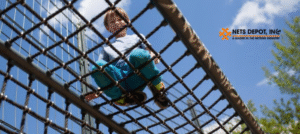Introduction to Barrier Netting
Barrier netting is a versatile and effective tool designed to protect your garden from a variety of threats, including pests, birds, and harsh weather conditions. Whether you’re a seasoned gardener or just starting out, understanding the importance of barrier netting can help you safeguard your plants and ensure a bountiful harvest. At Nets Depot Inc, we offer a wide range of high-quality barrier netting solutions to meet your gardening needs.
| Type of Barrier Netting | Purpose | Mesh Size | Material Characteristics |
|---|---|---|---|
| Pest Control Netting | Keeps insects and small animals away from plants | Fine mesh | Allows airflow and sunlight while preventing pests |
| Bird Netting | Protects fruit trees, berries, and other plants from birds | Larger mesh than pest control netting | Blocks birds without harming them |
| Garden Fencing | Acts as a physical barrier to larger animals such as deer and rabbits | Varies (larger openings) | Made from stronger materials to withstand weight and force |
| Weather Protection Netting | Shields plants from harsh weather conditions like hail, heavy rain, or strong winds | Varies | Durable materials that can withstand extreme weather |
Factors to Consider When Choosing Barrier Netting
Choosing the right barrier netting for your garden involves considering several factors to ensure optimal protection and efficiency. Here are the key factors to keep in mind:
a. Purpose
Identify the primary purpose of the netting. Are you trying to keep pests out, protect from birds, or shield your plants from the weather? Understanding your specific needs will help you choose the right type of netting.
b. Mesh Size
The mesh size is crucial in determining what kind of protection the netting will offer. For example, a smaller mesh size is ideal for keeping insects out, while a larger mesh size is suitable for bird protection.
c. Material
Barrier netting comes in various materials, including plastic, nylon, and metal. Each material has its advantages and disadvantages. For instance, plastic is lightweight and easy to install, while metal is more durable and long-lasting.
d. Durability
Consider the durability of the netting, especially if you plan to use it year-round. High-quality materials will withstand the elements and provide long-term protection for your garden.
e. Ease of Installation
Some types of netting are easier to install than others. Consider whether you prefer a netting solution that can be easily set up and taken down, or if you need a more permanent installation.
Read it: Barrier Netting: Navigating Key Points for Success in 2024
Installation Tips for Barrier Netting
Proper installation of barrier netting is crucial for it to be effective. Here are some tips to help you install your barrier netting correctly:
a. Measure Your Garden Area
Before purchasing netting, measure the area you need to cover. This will ensure you buy the right amount of netting and avoid any shortages.
b. Secure the Edges
Ensure that the edges of the netting are securely fastened to prevent pests from slipping through. You can use stakes, clips, or ties to secure the netting to the ground or surrounding structures.
c. Create a Frame
For larger areas or more permanent installations, consider creating a frame using poles or PVC pipes. This will help keep the netting taut and provide better protection.
d. Regularly Check for Gaps
Inspect your netting regularly for any gaps or holes that may have developed. Promptly repairing these will maintain the integrity of the barrier.

Maintenance and Care of Barrier Netting
Maintaining your barrier netting is essential to ensure its longevity and effectiveness. Here are some maintenance tips:
a. Regular Cleaning
Remove any debris, such as leaves and twigs, that may accumulate on the netting. This will prevent the netting from becoming weighed down and damaged.
b. Inspect for Damage
Regularly check the netting for any signs of wear and tear. Repair any holes or tears immediately to maintain the protection.
c. Store Properly During Off-Seasons
If you live in an area with harsh winters, consider taking down your netting and storing it during the off-season. This will protect it from potential damage caused by snow and ice.
| Benefit | Description |
|---|---|
| Protection from Pests and Birds | Barrier netting effectively keeps pests and birds away from your plants, ensuring your crops remain healthy and undamaged. |
| Improved Yield | By protecting your plants from various threats, barrier netting helps improve your garden’s overall yield, providing you with more fruits, vegetables, and flowers. |
| Reduced Need for Chemicals | Using barrier netting reduces the need for chemical pesticides and deterrents, promoting a healthier and more eco-friendly gardening approach. |
| Versatility | Barrier netting is highly versatile and can be used for a variety of purposes, from pest control to weather protection, making it a valuable addition to any garden. |
| Cost-Effective Solution | Investing in high-quality barrier netting is a cost-effective solution that provides long-term protection for your garden, saving you money on potential plant replacements and damage repairs. |
Common Mistakes to Avoid
While barrier netting is highly effective, there are common mistakes that gardeners should avoid to ensure optimal performance:
a. Choosing the Wrong Mesh Size
Selecting the wrong mesh size can render the netting ineffective. Make sure to choose a mesh size appropriate for the specific threat you are trying to protect against.
b. Improper Installation
Incorrectly installing the netting can create gaps and weak points. Follow installation guidelines carefully to ensure full coverage and protection.
c. Neglecting Maintenance
Failing to regularly maintain and inspect your netting can lead to deterioration and reduced effectiveness. Regular upkeep is essential for long-lasting protection.
d. Overlooking Environmental Factors
Consider the environmental factors in your area, such as wind and weather conditions, when choosing and installing your netting. This will help ensure that the netting remains intact and effective.
Frequently Asked Questions
Q1: What is the best type of barrier netting for vegetable gardens?
For vegetable gardens, pest control netting with a fine mesh size is ideal as it effectively keeps out insects and small animals while allowing air and sunlight to reach the plants.
Q2: How do I repair a tear in my barrier netting?
Small tears can be repaired using strong adhesive tape or a patch kit designed for netting. For larger tears, it may be necessary to replace the damaged section.
Q3: Can barrier netting be used year-round?
Yes, barrier netting can be used year-round. However, it’s important to choose a durable material and perform regular maintenance to ensure its longevity.
Q4: How do I prevent birds from getting tangled in the netting?
To prevent birds from getting tangled, use bird netting with a larger mesh size that allows birds to see and avoid it. Additionally, ensure the netting is taut and properly secured.
Q5: Is barrier netting safe for all types of plants?
Barrier netting is generally safe for most plants. However, ensure that the netting does not restrict the growth of larger plants and that it allows adequate air and light penetration.
Conclusion
Barrier netting is an invaluable tool for any gardener looking to protect their plants from pests, birds, and harsh weather conditions. By choosing the right type of netting and properly installing and maintaining it, you can ensure the health and productivity of your garden. At Nets Depot Inc, we are committed to providing high-quality barrier netting solutions tailored to meet your gardening needs. For more information, contact us at (305) 215-5579 or email us at info@netdepot.com.
Whether you’re dealing with pesky insects, hungry birds, or unpredictable weather, the right barrier netting can make all the difference in your gardening success. Invest in the best, and enjoy the fruits of your labor without worry.




